Earlier this year, Matt and I went on a scooter safari around West Africa. We knew we would enjoy the trip, but we needed to see if the logistics would be manageable with clients.
Four thousand kilometers later, we knew we had something. Now we just needed to find people crazy enough to travel with us. That’s a bit dramatic. Matt has been in tourism in Africa for nearly 20 years. I have been bouncing around West Africa for seven. We are riding 110 cc motorbikes on roads that are mostly free of traffic outside of cows and kids walking to school. And we found a route that has a little bit of everything – beaches, villages, rivers, mangroves, reggae bars, maquis under a tree, even a bush camp in a grove of baobab trees on a beach. It is damn fun.
But marketing is not our strong suit, and selling trips to West Africa – a region that lacks the tourist infrastructure and PR machine that you find in other parts of the continent – is not easy to begin with. That’s why we were a bit shocked when we sold our first trip with minimal promotion. How’d we do that? Luck, mostly.
Our first client was a friend of ours from Bamako. Our second client found out about the trips through one of my roommates here. He in turn recruited three of his friends from back home in the states (this trip is a great occasion to take a group trip with friends by the way). Five turned out to be the perfect number for our first trip.
Matt left several weeks early to secure the bikes, sort out bookings and devise a route through the mangroves with Aliou the boatman. The story of the paperwork for the bikes is one for another day. Without getting into it, the saga follows an Ivorian friend’s adage about West Africa: “anything is possible, but nothing is certain.”
My plan was to arrive a day before the clients in Dakar. I had my bike and a significant amount of baggage so the plan was to put everything on a bus, but bus companies wanted an outrageous price to transport the jakarta despite the fact that it was matriculated and had all of the necessary paperwork.
So we moved on to Plan B, a truck. Senegalese trucks regularly transport containers from the port in Dakar to Bamako, and then they return to Senegal empty. Well, some of them do.
We negotiated with an interlocutor who managed the drivers at a truck stop just outside of Kati, the gateway to Bamako. After agreeing on a price, I was told to show up on Wednesday for a late afternoon departure.
I arrived around two in the afternoon. The fixer was nowhere to be found, and I had no idea who the driver was or which truck we were taking, so I settled into the soap opera that was playing on the small tv on the terrace behind the nameless gas station. Eventually the fixer showed up, repeatedly promising an imminent departure. That seemed unlikely given that the truck and the driver were both in the wind.
After the sun went down, I started preparing a back-up plan involving a friend that does private car rentals with a pick-up truck. It would be a lot more expensive, but the truck situation did not look promising.
I was ready to head home at ten o clock, but then a truck creeped into the station and the fixer came running. “It’s here !! It’s here!”
The truck was not empty. It had a forty foot container strapped to it that was filled with cabbages. This was a major disappointment. The truck option appealed for two reasons: price and speed. The truck that sat before me was slower than a jakarta.
We strapped down my jakarta inside the container, and I hopped into the cab. Malick Lo was the driver, a 15 year veteran of the roads between Senegal and Mali. He didn’t speak any Bambara and had about 3 words of French under his belt. It looked like I would be learning some Wolof on this trip. His apprentice was Yaya Diallo, a young Fulani kid who only said the words “manger” and “police” to me throughout the whole trip.
Malick had also negotiated another passenger, Mamadou, who worked in Algeria and was heading back to Casamance to visit his family. I enjoyed Mamadou’s company, but the trip would have been a lot more pleasant if I was the only passenger. Mamadou and I shared Malick’s bed, the thin space behind the driver and passenger seats. We had a head to toe arrangement that got more complicated as the trip went on.
On the first night, we drove for about two hours and then pulled over in a small village. I arranged my bedroll and mosquito net inside the container, but as close to the open doors as possible. Yaya sprawled out towards the back of the container, where the fumes from the cabbages were probably toxic. Mamadou slept on the ledge on the back of the truck on a cot that was near the end of its life, and Malick slept inside the cab.
The following day, we crossed the border and made it to Saraya. We were not making good time, and we hadn’t even crossed the Niokolo Koba Park, the worst stretch of road on the trip.
In Saraya, we parked the truck next to a dusty patch of land that served as the neighborhood football pitch. I walked down the street to get some phone credit, and when I was about 200 yards away from the truck, I was hit with an overwhelming stench of rotting vegetables. As I walked back, I realized that they had opened the doors to the container and the smell was coming from the cabbages.
Mamadou and I wandered into the center of town, an intersection that saw a bit of life in the evenings. We found a restaurant where a young girl gave us a massive platter of peanut flavored rice with some grilled meat and vegetables heaped on top. I still don’t know what this rice dish was — it was not sauce arachide, and it wasn’t tchep — and I neglected to write down the name Mamadou used for it. It was as if the rice had been perfumed with roasted peanuts. However that sounds, it was delicious. We returned to the truck where we joined Malick and Yaya for a tea session before passing out. The following day would be the most difficult of the trip.
Gearing up for the park
While they have made significant progress resurfacing the road through the park, there are still about 100 kilometers that require some courage. Mamadou and I were thrown around the inside of the cab as we lurched through the roughest stretch. When we arrived in Tambacounda, Malick pulled into the main market area. Most of the cabbage was unloaded here, an ordeal that would add another couple of hours to the trip. It was Friday, the day I was supposed to arrive in Dakar, 460 kilometers away.
Malick promised to get to Kaolack that evening. We made it to Kaffrine. The following morning, I found Malick sitting on the side of the road at 5AM, which was typically when we set off each day. I didn’t understand most of what he told me, but it was clear that there was a problem involving him, his boss and me arriving anywhere I needed to in my timeframe.
At this point, it was too late for me to get to Dakar, but I still needed to get to Fatick at the very least. I had been irritated with Malick’s series of false promises, but now I was genuinely angry, and I did not hide it from him when I explained that I was going to look for alternate transportation. He did his best to patch things up by finding me another truck within a matter of minutes.
From Kaffrine to Fatick, I found myself on a refrigerated truck carrying charcuterie for a company called “le p’tit cochon” (the little pig). Compared to the cabbage truck, it felt like we were driving at light speed. We arrived in Fatick less than two hours later.
I found Matt at a gas station on the side of the highway. The bikes were getting gassed up and washed. It was Saturday morning. We just needed to get to Dakar for an evening meet up with the group. Suddenly everything was within reach.
We made it to Dakar before sunset, met up with the group and then went for a few drinks at some familiar spots. Matt and I were well behaved and didn’t do anything excessive, like buy several bottles of whisky.
The following morning, we all met up to hop on a minibus we had rented to go to Fatick (there was no way were going to have clients get oriented with the bikes in Dakar traffic). We arrived there a couple hours later. After taking some time to get comfortable on the bikes, we were ready to hit the road.
Group shot with Maimouna, the daughter of the owner of the campement where we kept the bikes overnight.
And just like that, the trip was on. Click here to see how it went.



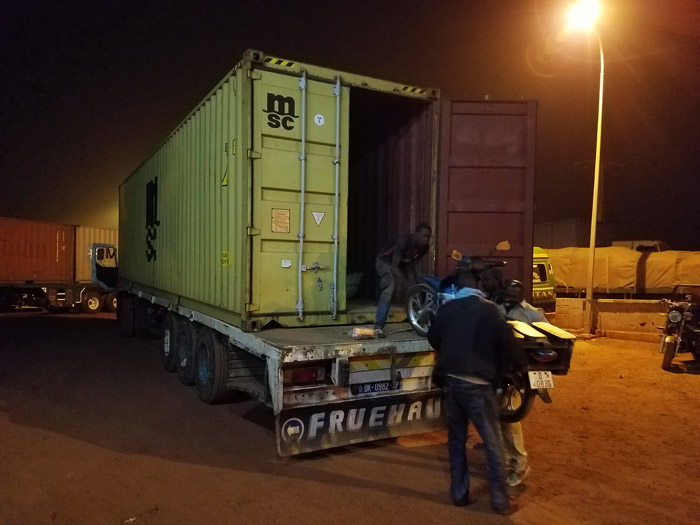
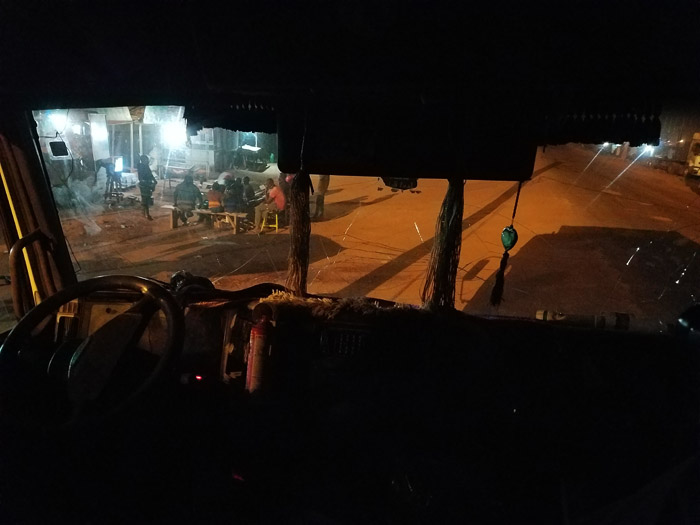
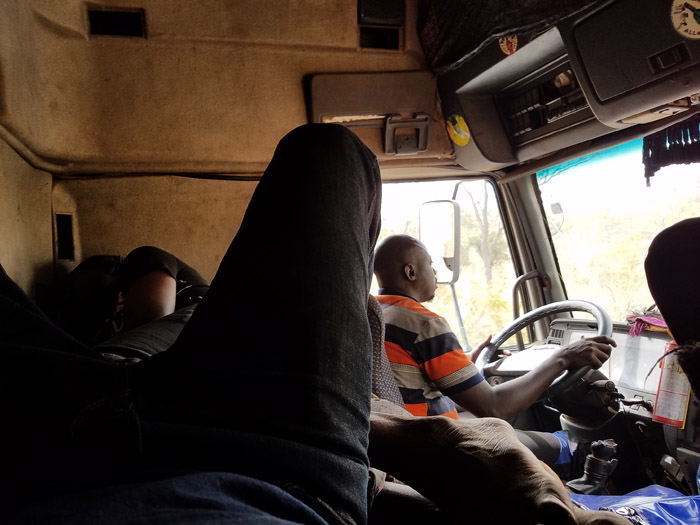
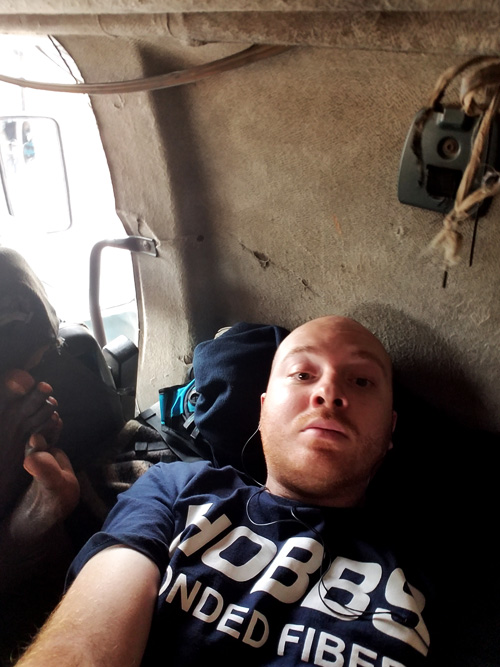
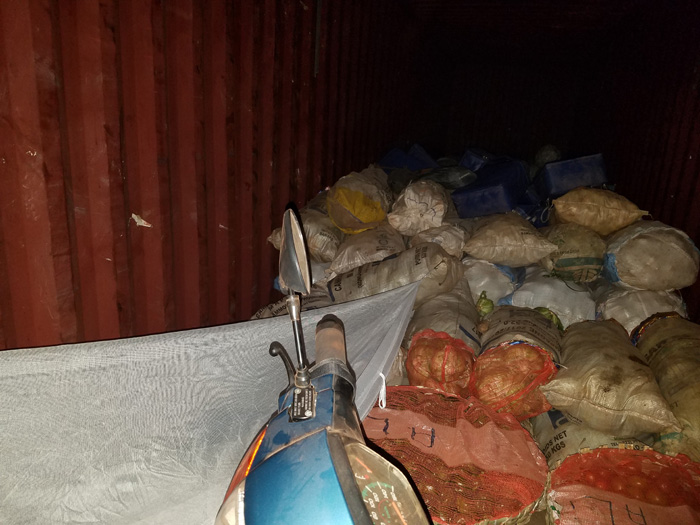


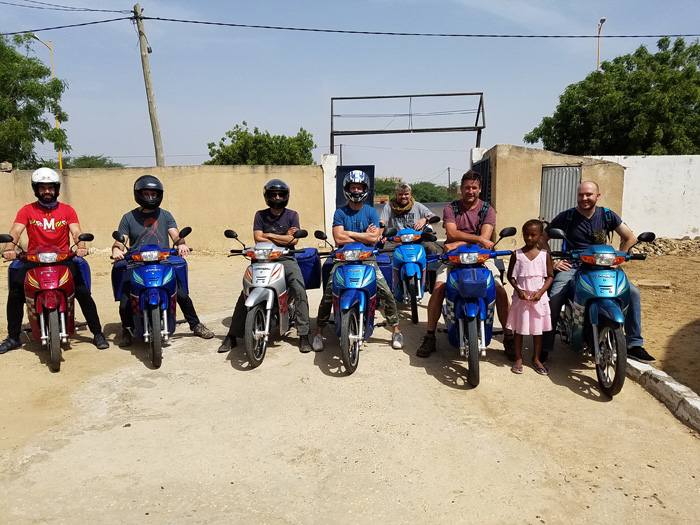
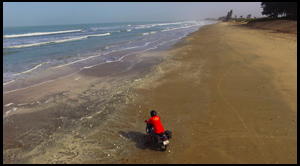
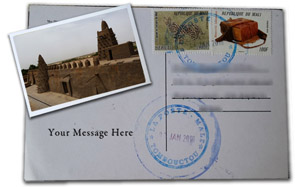
Wow, that’s quite the adventure. I so wish I could join you on one of these trips, but I’ve got zero motorbike experience, so it sounds like its not a good idea.
Ever ride a moped or a scooter?
Nope. Only ordinary bicycles, and 4 wheel motorized vehicles (cars, etc).
Ok, well if you want to chat about it, send me an email at info@scootwestafrica.com